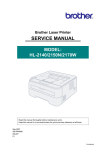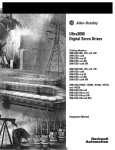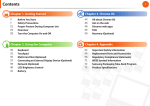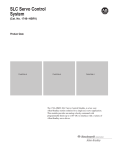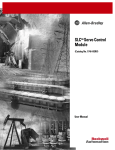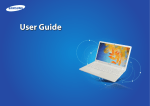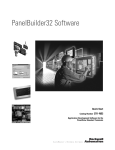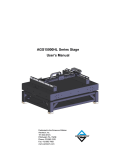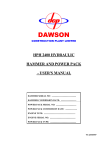Download Installation Instructions
Transcript
SLC Motion 1746 HSRV Integration/Installation Guide The SLC Servo Control Module is compatible with the SLC family. It is designed to be used with an SLC 5/03 FRN 5.0 and later processor. You can program and commission the system using RSLogix 500, AI 500 or APS (5.0 or Later). Once the SLC Processor is initiated, block execution is independent of the scan time of the processor. Blended motion allows for complicated move profiles consisting of two to 32 segments. The blended move profiles are stored in the SLC Servo Control Module’s internal memory as a series of absolute moves. Since the sequence of moves is stored in internal memory, it can be executed more than once. Other move or homing operations can be performed between blended move profiles. 1746-HSRV Motion Module Each SLC Servo Control Module requires 12 input words and 12 output words. You don’t need to do any off-line programming. The motion profile or sequence is determined in the RSLogix 500, AI 500, or APS (version 5.0 or higher) software that you use to program the SLC processor. You can command the following actions: · Absolute moves · Incremental moves · Speed moves · Monitor moves · Hold moves · Unhold moves · Blend moves · Emergency stop operations · Homing operations · Preset operations · Clear faults · Alternate home moves You can configure and program up to 16 separate blend motion profiles to command from 2 to 32 segments of absolute move commands. Three LED indicators are available, allowing you to quickly identify and troubleshoot faults. More 1746-HSRV features include: • Analog velocity command with programmable limits to interface with servo drives • Three (3) fast inputs, and one (1) fast output • 32 bit range for absolute positioning and blended motion profiles for complex moves • Interfaces directly with +5 or +15V encoders 1746-HT Termination Panel Installation of the 1746-HSRV Hardware Configuration Important When wiring the multiple power sources for the HSRV be sure to follow the following diagram for reference. Also reference the 1746-6.1.2 HSRV User Manual. 1746-HT Sample wiring diagram for the 1746-HSRV and the Ultra 3000 servo controller Drive ULTRA 3000 Drive Dr Ret SHLD Interface cable: 2090-U3CC-D44xx Encoder CN1 CH A Hi CH A Lo A B SHLD CH B Hi CH B Lo Z SHLD CH Z Hi CH Z Lo 17 CH A18 CH B+ 19 CH B20 CH I+ 21 CH I2 Power Supply Encoder Power Ext Power +5V RET +15V +/- RET -15V +24 +24RET EGND CN2 16 CH A+ +5V RET +15V SHLD Common 25 Command + 26 Command - 27 I/O Common 28 29 I/O Power 30 Drive En Drive Fault Reset L1 L1 L2 L2 G 31 Drive Enable 32 Fault Reset 39 U V W 43 Relay + 44 Relay - G L1 L2 Estop +24V RES PB RES PB RESET String In String Out Estop Reset F, H, N, MP, Y series motor with hi-res or encoder option. GND BAR 7-8-02 2090-UXNFBxx-Snn IMPORTANT NOTES: 1. Estop PB O.T. 2. Fast I/O FI.1 +24V FI.2 +24V FI.3 RET F0 2090-UXNPxxx-nnSnn OPTIONAL O.T. BYPASS 3. 4. 5. 6. Notice velocity command signal to Ultra drive is swapped to maintain proper phasing. If motor direction is not correct, swap Velocity cmd+ with Velocity Cmd -, also swap all of channel A with channel B, then swap Channel B Hi with Channel B Lo. For better noise immunity wire the Motor and Drive Thermals to a separate control relay (CR), and wire the associated contacts into the Estop circuit. Set Digital Output Parameters in Ultrware to: Relay: Ready Set Digital Input Parameters in Ultraware to: Input 1: Drive Enable Input 2: Fault Reset Set Encoder Parameters in Ultraware to: Output Signal: Buffered Divider: 1 Max Output Freq: 500kHz Marker Gating: Gated with A and B Setting Up Your SLC Servo Module Before performing the procedures given in this chapter, follow the installation procedure supplied with the drive that will be interfaced to the SLC Servo Module. This chapter provides information to help you setup and configure the SLC processor and the SLC Servo Module and includes the following topics: (refer to publication 1746-6.1.2 for further information) · Understanding the theory of motion control · Powering up the SLC Servo Module · Communicating between the SLC processor and the SLC Servo Module · Entering encoder lines and computing counts · Initializing DAC output voltage for drive symmetry · Setting initial loop type · Defining positive axis movement for the SLC Servo Module · Coarse calibrating drive input scaling to SLC Servo Module DAC output voltage · Fine calibrating of the DAC output voltage scaling · Computing excess following error limit · Selecting loop type · Selecting axis acceleration rate · Determining velocity and acceleration feedforward (for zero following error loop type only) · Setting axis and home specific parameters · Understanding programming conventions · Configuring your SLC processor · Understanding your SLC Servo Module interface · Configuring your SLC Servo Module · Before programming your SLC Servo Module · Downloading your configuration · Understanding configuration errors · Configuring the M0 file data tables · Configuring the M0 file floating-point data tables · Understanding configuration parameters · Homing options Understanding the Theory of Motion Control The major components of a motion control system are: · Machine mechanics · Velocity loop · Position loop Machine Mechanics Machine mechanics are the combined gearing, ball-screws, and mechanical linkages that convert the motor’s rotary motion into the axis motion that you want. Velocity Loop Velocity loop is a feedback control loop in which the controlled parameter is encoder velocity. A tachometer is usually used for the feedback device. Command input from the controller to the drive is a DC voltage that is proportional to encoder speed (e.g., 1V equals 5 rpm and 5V equals 5000 rpm). Using the tachometer as feedback, a drive maintains the speed of the encoder at the commanded speed within its output capabilities. A typical drive contains adjustments to do the following: · Scale the input command voltage to the motor speed. · Zero the motor speed for a zero input command. · Set the maximum current (torque) to the motor. · Control the response of the velocity loop. Refer to the drive manual for instructions on setting these adjustments. Position Loop Position loop is a feedback control loop in which the controlled parameter is mechanical position. The position loop compares position feedback with the position command to modify the velocity output signal to correct for any position error. Encoders are position measuring devices that provide the SLC Servo Module with precise actual axis position at all times. Based on motion statements, the SLC Servo Module computes an axis position and compares it to the actual axis position. Following error is the difference between the commanded axis position and the actual axis position. Axis gain (or position loop gain) sets the response on the position loop and scales the following error to the velocity command output (drive input). Your SLC Servo Module is a single-axis motion control that resides in a 1746 (SLC) rack. With a drive and servo motor, an SLC Servo Module can control the position of one axis with encoder feedback. You can place multiple SLC Servo Modules in one SLC Rack to control an entire machine. Powering Up the SLC Servo Module The SLC Servo Module requires power from the SLC Rack backplane and the termination panel for proper operation. You must power-up the SLC Rack with the SLC Servo Module in the rack. To power-up the SLC Servo Module: 1. Verify that your power supply connections for +5V DC, ±15V DC, and +24V DC are properly connected to the termination panel. 2. Verify that your cable between the termination panel and the SLC Servo Module is plugged in at both ends and the connectors are securely in place. 3. Apply power to the termination panel and SLC Rack power at the same time. The SLC Servo Module’s green RUN LED is lit after a short delay for diagnostics. 4. If the SLC Servo Module’s RUN LED is: Then: ON - Module is OK – continue configuration OFF - Go to step 1. (The SLC processor indicates a slot fault at the SLC Servo Module location.) Configuring the SLC Processor The SLC processor must be configured to accept the SLC Servo Module as an I/O device. Configure your processor by using the AI500, APS, or RSLogix 500 software running on a personal computer. Using RSLOGIX 500 – start a new project. Select the correct processor based on application requirements. Edit I/O configuration for rack (s) and necessary I/O per application requirement. This is also when the 1746-HSRV motion module is selected and placed into the correct slot. Program example from 1746-HSRV sample. An alternate method will use the sample program from Allen-Bradley. This program contains many of the steps for setting up the module as found in chapter 7 of publication 1746-6.1.2 – July 2000. HSRV Sample.RSS, This program contains some basic starting/testing ladder logic for the HSRV module. Ladder files 3 & 5 contain this logic for the 1746-HSRV. The file 3 is shown above. File 3 contains the ladder diagram for the configuration and control of the HSRV module. One key ladder file that is detailed for the HSRV module is ladder file 3. The above diagram points to this file and the configuration rungs. These rungs configure the HSRV. This is where all the setup parameters are loaded into the HSRV module. Note: This must be done on every power-up sequence. The 1746-HSRV does not have any memory retention on power cycles. Reference chapter 7 of the Publication 1746-6.1.2 July 2000. This example of ladder logic from the sample program shows discrete bits and also copy module for sending data to the HSRV module. This bits and data words for the HSRV may be found in the User Manual chapter 8. This is the Chapter on “Programming the SLC Processor to run the SLC servo module”. Additional logic may be added for status and feedback such as position, velocity and following error status information. This data may be found in the appendix A. “Input/Output Quick Reference”. Communicating Between the SLC Processor and the SLC Servo Module Communication between the SLC processor and the SLC Servo Module occurs asynchronously through 12 input and 12 output words. The SLC Servo Module requires that an input is present from one to two coarse iterations before it is guaranteed to be recognized. SLC Servo Module ladder logic rungs contain timers that can provide the proper timing. The preferred method is to build handshake logic into the SLC Servo Module ladder program. A handshake occurs when the SLC processor requests a change and tests for an appropriate change in the SLC Servo Module status word before continuing. The SLC Servo Module can deny requests from the SLC processor because the SLC Servo Module is not in the correct state to grant the request. Some SLC Servo Module inputs are only recognized on the input transition. If the SLC Servo Module is not in the correct state to grant a request when the input transition occurs, the input request is denied. Unless you toggle the input again, the SLC Servo Module ignores the request. Before Programming the SLC Servo Module Before programming your SLC Servo Module: 1. Power-up the SLC Servo Module to initialize the default configuration. 2. Verify that the SLC Servo Module is in an Estop state. 3. Copy the M0 file with the output word 0 mode bit (15) set to 1. 4. Verify that the SLC Servo Module is in the configuration mode. 5. Using the programming device for the SLC processor (RSLogix, AI500, or APS Software) enter the program example, found in Appendix C of this manual, with the appropriate changes for the SLC Servo Module locations for the system. 6. Using the data monitor, change the values in the configuration files to match the default specifications for the SLC Servo Module, except for the Encoder Lines and Counts Per Position Configuring the SLC Servo Module You configure the SLC Servo Module using M files that reside on the SLC Servo Module. Refer to the SLC 500 Reference Manual (publication 1747-6.15), M0 and M1 data file section, for the M file interface and addressing convention information. M files reside on the module and are referenced by the ladder logic the same way as an integer file that resides on the module. There are two M files (M0 and M1) associated with this and any specialty module. The SLC Servo Module only uses the M0 file that is used to transfer the configuration information from the SLC Ladder to the SLC Servo Module. Refer to Figure 7.1 for a functional block diagram of the data flow. The application program uses a copy file instruction to transfer the data from a source integer or float file to the M0 file in the slot that you want in the SLC Servo Module. A copy file instruction associated with the M files works as an immediate output instruction. Therefore, the normal ladder program execution stops when it encounters the copy instruction with the M file. Ladder program execution does not resume until the SLC processor has transferred the information to the M0 file of the SLC Servo Module. NOTE: Repeatedly executing the copy file instruction when you download the configuration increases the ladder scan time. Module Configuration Unit parameters: For program example, the discrete configurations are in file N7 and the multiword floating-point parameters are in file F8. Configuring the M0 File Data Tables The following tables contain configuration data for M0 word 0, word 1, and 2. Word 0 Bit Parameters Parameter Name Source N File Location (note 1) DAC Enable Nn:0/0 Destination M File Location Possible Values (note 2) Re-home Default M0:s.0/0 Yes (1) / No (0) No Yes Invert DAC Nn:0/1 M0:s.0/1 Yes (1) / No (0) No No Reverse Feedback Nn:0/2 M0:s.0/2 Yes (1) / No (0) No No Reserved Nn:0/3 M0:s.0/3 Loop Type Nn:0/5 Nn:0/4 M0:s.0/4 M0:s.0/5 Open (00) / FE (01) / VFF (10) / Reserved (11) No FE (01) 5=0, 4=1 Velocity Time Base Nn:0/6 M0:s.0/6 Minutes (1) / Seconds (0) No Minutes Overtravels Used Nn:0/7 M0:s.0/7 Yes (1) / No (0) No Reserved Nn:0/8 M0:s.0/8 Home Type Nn:0/10 Nn:0/9 M0:s.0/10 M0:s.0/9 Yes Homing Without a Limit Switch or Marker (00) / Homing to a marker (01) / Homing to a Limit Switch (10) / Homing to a Limit Switch and Marker (11) Final Move to Which Marker? Nn:0/11 M0:s.0/11 Marker Nearest Start Position (0) / 1 Rev, then Nearest Marker (1) Yes Marker Nearest Start Position Final Move to Marker? Enable Incremental Position command Nn:0/12 M0:s.0/12 Yes (1) / No (0) Yes Yes Nn:0/13 M0:s.0/13 Yes (1) / No (0) No 0 Blend Move Profile Nn:0/14 M0:s.0/14 Yes (1) / No (0) No No Mode Flag Nn:0/15 M0:s.0/15 Configure (1) / Command (0) No Command 0 No 0 Home to Marker 10=0, 9=1 1) Nn - Source N file number containing the module configuration data. 2) s - Slot number for the SLC Servo Module to be downloaded. Word 1 Bit Parameters Parameter Name Source N File Destination M Location File Location Possible Values Limit Source Nn:1/0 MO:s.1/0 Team Panel (1)/Backplane (0) Yes Backplane Synchronized Move Source Nn:1/1 MO:s.1/1 Team Panel (1)/Backplane (0) No Backplane Re-Home Default Reserved MO:s.1/2 Nn:1/2 through through ML:s.1/5 Nm:1/5 Discrete Bit Status Word 1 Definition Nn:1/6, Nn:1/7 Series, Major Rev, Minor Rev (00)/ Blend Move Profile Segment (10) / MO:s.1/6,MO:s.1/7 Reserved (01)/ Reserved (11) No Series, Major Rev, Minor Rev, 7=0m, 6=0 Inhibit Informational Codes Nn:1/8 MO:s.1/8 Yes (1)/No (0) No No Inhibit Minor Fault Codes Nn:1/9 MO:s.1/9 Yes (1)/No (0) No No Inhibit Major Fault Codes Nn:1/10 MO:s.1/10 Yes (1)/No (0) No No Reserved Nn:1/11 MO:s.1/11 Inhibit Actual Position Nn:1/12 MO:s.1/12 Yes (1)/No (0) No No Inhibit Following Error Nn:1/13 MO:s.1/13 Yes (1)/No (0) No No Inhibit Current Speed Nn:1/14 MO:s.1/14 Yes (1)/No (0) No No Reserved Nn:1/15 MO:s.1/15 0 0 0 Word 2 Bit Parameters Parameter Name Source N File Destination M Location File Location Possible Values Re-Home Default Fits per CIT MO:s.2/0 Nn:2/0 through through MO:s.2/3 Nn:2/3 0011-3 Fits per CIT, coarse time=4.8 msec 0100-4Fits per CIT, coarse time =6.4 msec 0101 - 5 Fits per CIT, coarse time = 8.0 msec 0100 - 6 Fits per CIT, coarse time = 9.6 msec Yes Reserved MO:s.2/4 Nn:2/4 through through MO:s.2/15 Nn:2/15 0 Reserved Nn:3 0 MO:s.3 0011 Configuring the M0 File floating-Point Data Table The table below contains configuration data for the M0 file floating-point data table (M0 word 4 to word 43). Word 4 or Multi-Word Parameters Parameter Name Source N File Destination M Location File Location Possible Values Re-Home Default Encoder Lines (Lines/Rev) Fn:0 MO:s.4,s.5 1 to 8000 Yes 1000.0 Counts per Position Unit Fn:1 MO:s.6,s.7 Yes 4000.0 Positive Overtravel Limit (Position Units) Fn:2 MO:s.8,s.9 1.0 to 16909320.0 Negative Overtravel Limit to +axis travel limit No 100.0 -100.0 Negative Overtravel Limit (Position Units) Fn:3 MO:s.10,s.11 -axis travel limit to Positive Overtravel No limit Rollover Position Fn:4 MO:s,12,s.13 0.0 to axis travel limit No 0.0 Yes 0.0 Home Position (Position Units) Fn:5 MO:s.14,s.15 Negative Overtravel Limit to Positive Overtravel Limit Home Calibration (Position Units) Fn:6 MO:s.16,s.17 -axis travel limit to +axis travel limit Yes 0.0 Speed/Direction of Move Off the Limit Switch (Position Units/Time) Fn:7 MO:s.18,s.19 -physical lilmit to +physical limit Yes 20.0 Speed/Direction of Move to the Marker (Position Units/Time) Fn:8 MO:s.20,s.21 -physical limit to + physical limit Yes 20.0 Reversal Error Value (Position Units) Fn:9 MO:s.22,s.23 0.0 to axis travel limit Yes 0.0 Output Voltage at + Max Speed (Volts) Fn:10 MO:s.24,s.25 0.0 to 10.0 No 10.0 Output Voltage at - Max Speed (Volts) Fn:11 MO:s.26,s.27 -10.0 to 0.0 No -10.0 Maximum Axis Speed (Position Units/Time) Fn:12 MO:s.28,s.29 0.0 to + physical limit No 3000.0 Time to Maximum Axis Speed (Seconds) Fn:13 MO:s.30,s.31 0.0 to + physical limit No 1.0 Velocity Feedforward Constant Fn:14 MO:s.32,s.33 0.0 to 1.0 No 0.0 Acceleration Feedforward Constant Fn:15 MO:s.34,s.35 0.0 to 1.0 No 0.0 Home Tolerance (Position Units) Fn:16 MO:s.36,s.37 0.0 to axis travel limit No 0.1 Excess FE Limit (Position Units) Fn:17 MO:s.38,s.39 0.0 to axis travel limit No 3.0 In-position Band (Position Units) Fn:18 MO:s.40,s.41 0.0 to axis travel limit No 0.1 Axis Gain (Position Units per Minute per One Thousandth of the Position (Unit) Fn:19 MO:s.42,s.43 0.0 to 10.0 No 1.0 Programming Conventions The SLC Servo Module accepts and generates different types of data: · Binary data that is compatible with the binary or integer files for the SLC processor. · Integer data that is compatible with the SLC processor integer files. · Floating-point data that is compatible with the SLC processor floating-point files. As the module interfaces to floating-point files, it is only compatible with the SLC 5/03 FRN 5.0 and above processors. Refer to the SLC 500 Reference Manual (publication 1747-6.15) for the floating-point file information. Downloading Your Configuration When you download your configuration using the M0 file for the module that you want, the types of data that are included are: · Discrete parameters · Floating-point parameters You can download to the module using two copy file instructions to the M0 file of the SLC Servo Module: · The first copy file instruction copies discrete information. · The second copy file instruction copies floating-point information. Depending on the values specified in the configuration, the module accepts the data or generates configuration errors through module input status words that are described in the next section. Discrete Block Commands from the SLC Processor The discrete block commands are sent from the SLC processor to the SLC Servo Module using discrete I/O. It contains two words of bit information and a variable number of integer and/or floating-point values. Words 0 and 1 contain the SLC processor to SLC Servo Module discrete bit commands. Words 2 and 3 contain the Incremental Position command. Words 4 through 11 contain command blocks that control motion and/or motion related activities. The SLC Servo Module responds to the new block command every time it differs from the one previously received. If command word 4 or word 5 is not zero, the SLC Servo Module reads each subsequent word to verify a change. The Plan Synchronized Move bit can be set in conjunction with a move in the simple move command set. To issue a discrete block command, set only 1 bit in words 4 and 5. If the SLC Servo Module finds more than one bit set in words 4 and 5 (except as noted earlier), an error is reported to the SLC processor. As each block command is executed, the SLC Servo Module informs the SLC processor in a closed-loop fashion, using the SLC Servo Module to SLC processor discrete status bits. The discrete commands are classified into Incremental Position commands and simple move commands that are discussed in this section and into Position Initialization commands and On-line. Recovering from Estop If the Estop string is opened during a move, the move aborts. You can initiate another move once the Estop Reset is issued and the module is out of Estop. This can be done by setting/changing either the command bit, %Acceleration, Speed, Endpoint, or profile number. If these bits were set while in Estop, they must transition after the Estop resets to start a new move. If command parameter preparation requires more than one program scan, set up the accompanying parameters before setting the command bit. Simple Move Commands All simple moves are mutually exclusive. The simple move commands are the bsolute/Incremental, Speed, Monitor, and Run Blend Move Profile commands. The currently executing move is considered complete when a new move is commanded by the SLC processor. A new move occurs when a change happens to any one of the following: · Command bit · % Acceleration parameter · Velocity Unit Per Timebase (speed) parameter · Position (endpoint) parameter · Blend Profile number For example, if an Absolute Move command is executing and the module receives a Speed Move command, the Absolute Move command is considered finished and the currently executing move command is blended into the new Speed Move command. This means that the execution and blending of moves is totally under SLC Ladder Logic Control. The units for simple moves are: · The position for each move block is in programming units (for example, inches, millimeters). · The speed for each move block is in programming units (for example, inches per minute, millimeters per second). · The acceleration or deceleration specified is in the percentage (0.0-1.0) of the maximum acceleration specified. Using Simple Move Commands The simple move commands discussed in this section are: · Absolute/Incremental command · Speed command · Monitor command · Run Blend Move Profile command Using the Absolute/Incremental Move Command The absolute move command generates a move equal to the difference between the specified target position and the current position, causing a positive or negative move, depending on the current axis position. Absolute and incremental move parameters for word 4, bit 0/1 appear in the table below. The SLC Servo Module responds differently depending on which command has not completed (if any) when the Incremental Move is initiated, as shown in the table below. If the SLC Servo Module is configured with the rollover position, the move commanded can cause multiple rollovers. The following information applies to the Absolute/Incremental move: · The speed specified for the move is the absolute maximum for the move. · If the speed specified is greater than the Maximum Axis Speed, the speed for the move is limited to the Maximum Axis Speed · The axis has to be homed to perform an absolute move · If an error occurs while executing the move, the SLC processor is notified. The Absolute/Incremental move ends if any one of the following occurs: · The move reaches its destination. · The SLC processor cancels the move. The Cancel Move bit is used to cancel the absolute or incremental component of the move. Setting the Cancel Move bit does not affect an incremental position command component (i.e., the specified incremental position command continues unless it is set to zero). · An Estop occurs. · The SLC processor sends another move from the mutually exclusive move set including a move of the same type with different % Acceleration Ramp, Speed, or Position/Increment. A new absolute move can also be initiated by simply changing the acceleration, speed or position and keeping all other discrete bits the same. Planning an Absolute/Incremental Move. Below shows a typical ladder program block diagram that initiates an absolute/incremental move from the SLC processor. Other moves are initiated similarly by setting appropriate values in the data tables and copying the data to the appropriate module output words. Absolute/Incremental Move Command Block Diagram This program “rung” is very useful to see the “position, following error & speed” from the motion axis. Troubleshooting.. Error Messages and Diagnosis The user manual provides a numerical listing of informational messages, minor fault messages, and major fault messages accompanied by potential causes and possible resolutions. Additional information may be found at: http://support.rockwellautomation.com/ this is the “support” web site. Search for “HSRV” under the Knowledgebase selection. A sample program and also troubleshooting tips may be found here. The user manual may be downloaded from: http://www.ab.com/manuals/gmc/ use SLC Products for further searching.

































